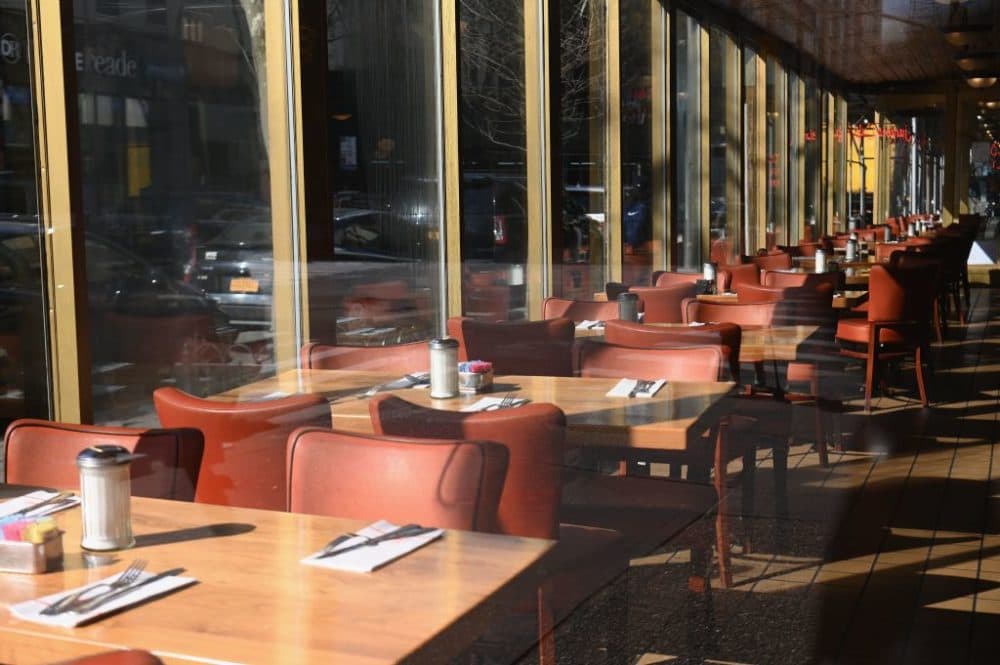Advertisement
Tom Colicchio Of 'Top Chef' Says Restaurants Will 'Struggle' To Reopen Without More Assistance
Resume
On top of closing his restaurants to prevent the spread of the coronavirus, New York City chef and restaurateur Tom Colicchio had to lay off more than 450 employees.
The “Top Chef” star warns that 75% of independent restaurants in the U.S. will not reopen without more assistance.
If his restaurants were open, he says the money would go toward bills incurred 30 to 45 days ago. Restaurant owners also don’t have an idea of when they can reopen.
The CARES Act and the Paycheck Protection Program (PPP), economic relief bills passed by Congress, don’t go far enough to help restaurants, he says.
PPP requires business owners to spend 75% of the loan on payroll while the rest can go toward other expenses such as rent and utilities. This system doesn’t work for restaurants that aren’t open, he says.
He worries if he brought his employees back on payroll, the loan money would run out before the restaurant even reopened. To fix the problem, he suggests pushing the date that businesses need to start hiring back workers back to when they can reopen.
Once doors open again, he thinks restaurants need four months of payroll protection to help pay the bills. Then, he hopes an additional stabilization package from Congress can provide loans or grants to help keep restaurants open.
The industry is the country’s second-largest private employer with about 11 million people working at independent restaurants. If half of those restaurants reopen but then close two months later, that could put another 5.5 million people back on unemployment, he says.
Restaurants won’t see their regular crowds again until the public believes it’s safe to go to busy places, he says, and that won’t happen until there’s an effective coronavirus vaccine.
“When I open up in August, I'm not going to be anywhere near capacity,” he says. “And so if we're operating at half capacity, we're losing money.”
Before Congress passed the CARES Act, President Trump seemed confident about the future of the restaurant industry.
“What we're doing in terms of loans, what we're doing in terms of salaries, they'll all come back,” Trump said. “It may not be the same restaurant, may not be the same ownership, but they'll all be back.”
Colicchio says the president’s position is “misinformed” and “cavalier.” The industry isn’t asking for a bailout but rather to reopen and employ people, he says.
If the president spent time looking at what PPP does and doesn’t do for small businesses, Colicchio thinks Trump’s tone would change. A specific plan regarding payroll and supporting small businesses would help the industry, he says.
Colicchio agrees that the industry will bounce back, but with the amount of help offered by the CARES Act and PPP, it could take 10 to 15 years — which isn’t good enough for him.
“I don't think he quite understands how devastating this has been to small businesses. We're going to see a lot of empty storefronts,” he says. “This will go on in every single small town across this country.”
Many restaurants remain open for takeout and delivery, but he says it’s not comparable to business as usual.
Restaurants can pay as much as 30% using delivery services like DoorDash or UberEats, which he says isn’t sustainable. He’s spoken to several chefs who started offering takeout or delivery but realized it wouldn’t work because they lost more money every day.
He considered doing takeout and delivery but decided against it because of the doctors and scientists recommending people stay home. His employees in New York City take public transportation into work and he doesn’t want to put them at risk for a small number of sales.
Plus, he says his staff is receiving good unemployment benefits in New York — just over $1,000 per week — and can receive assistance for a longer period of time than usual.
“This is why I think it's really important to get more testing, especially antibody tests,” he says. “If I knew 10 of my cooks have had COVID, they can't be infected, they're not going to infect anybody, that would change my calculus in terms of opening and what I would do right now.”
Colicchio is confident his staff will come back to their jobs once he reopens. Most of his employees love serving people and working in hospitality, he says.
His restaurants offer food and wine but they also “make people happy” — a phrase plastered in red on a big sign across the office, he says. The drive to make customers happy isn’t a learned skill, but rather something inside his workers that drive them to go the extra mile.
“Restaurants operate like a family,” he says. “We're hearing every day how they want to get back in there and they want to do what they do.”
With restaurants closed, more people are cooking at home. He thinks this will help people understand what it takes to produce food and grow a greater appreciation for someone else cooking for them.
Once restaurants reopen, Colicchio believes his customers will also come back because “restaurants aren't only about food — and that's coming from a chef.”
Restaurants are cultural institutions, he says, just like musicians, artists, museums and libraries. He believes people view restaurants as “anchors” of their communities: places to come together and celebrate graduations, anniversaries, birthdays or even fundraisers.
“Our cultural institutions need to be taken care of,” he says, “because after this is over, that's exactly where we're going to want to go to feel better again.”
Ciku Theuri produced and edited this interview for broadcast with Peter O'Dowd. Allison Hagan adapted it for the web.
This segment aired on April 17, 2020.

